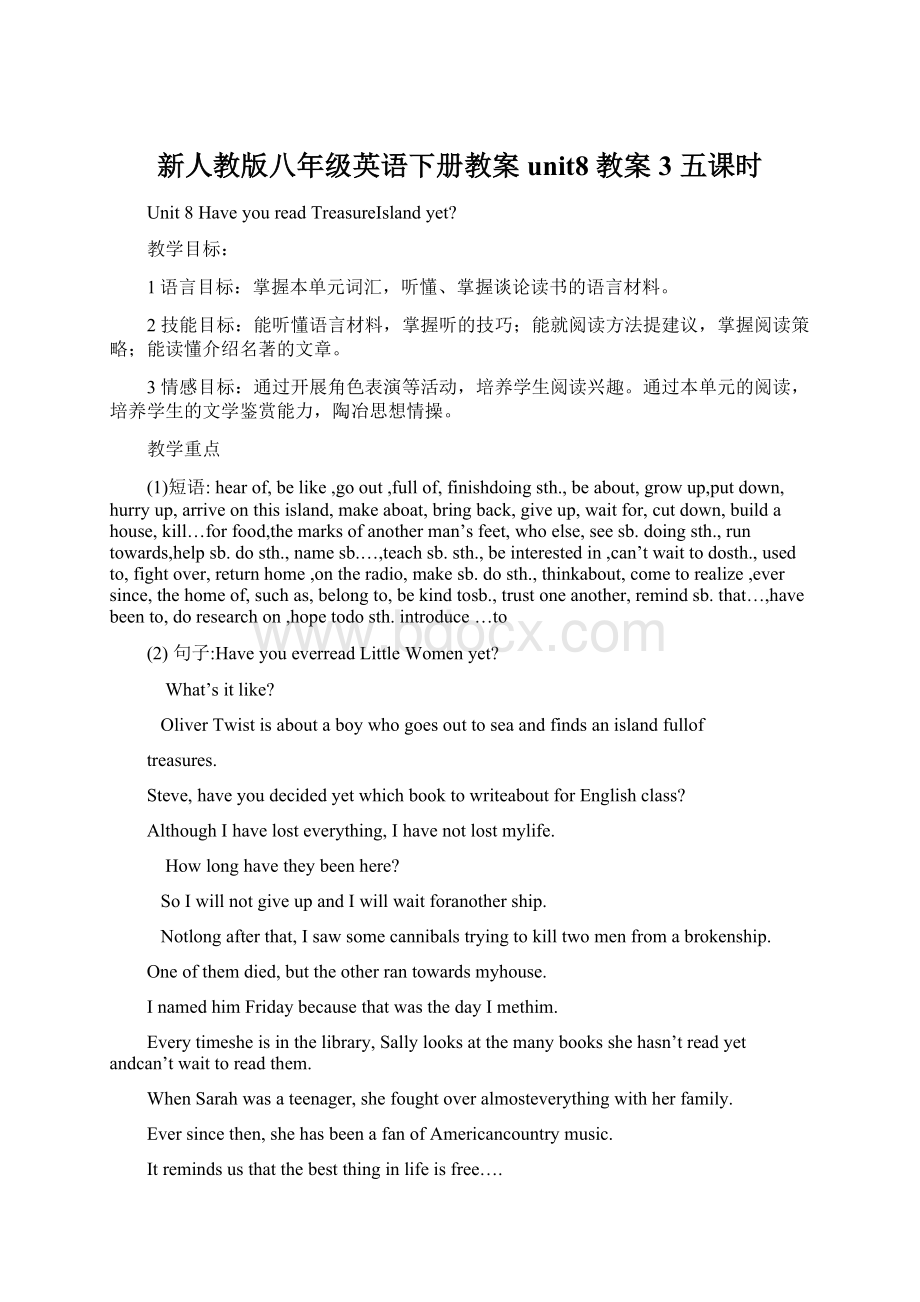新人教版八年级英语下册教案unit8 教案3 五课时.docx
《新人教版八年级英语下册教案unit8 教案3 五课时.docx》由会员分享,可在线阅读,更多相关《新人教版八年级英语下册教案unit8 教案3 五课时.docx(15页珍藏版)》请在冰豆网上搜索。

新人教版八年级英语下册教案unit8教案3五课时
Unit8HaveyoureadTreasureIslandyet?
教学目标:
1语言目标:
掌握本单元词汇,听懂、掌握谈论读书的语言材料。
2技能目标:
能听懂语言材料,掌握听的技巧;能就阅读方法提建议,掌握阅读策略;能读懂介绍名著的文章。
3情感目标:
通过开展角色表演等活动,培养学生阅读兴趣。
通过本单元的阅读,培养学生的文学鉴赏能力,陶冶思想情操。
教学重点
(1)短语:
hearof,belike,goout,fullof,finishdoingsth.,beabout,growup,putdown,hurryup,arriveonthisisland,makeaboat,bringback,giveup,waitfor,cutdown,buildahouse,kill…forfood,themarksofanotherman’sfeet,whoelse,seesb.doingsth.,runtowards,helpsb.dosth.,namesb.…,teachsb.sth.,beinterestedin,can’twaittodosth.,usedto,fightover,returnhome,ontheradio,makesb.dosth.,thinkabout,cometorealize,eversince,thehomeof,suchas,belongto,bekindtosb.,trustoneanother,remindsb.that…,havebeento,doresearchon,hopetodosth.introduce…to
(2)句子:
HaveyoueverreadLittleWomenyet?
What’sitlike?
OliverTwistisaboutaboywhogoesouttoseaandfindsanislandfullof
treasures.
Steve,haveyoudecidedyetwhichbooktowriteaboutforEnglishclass?
AlthoughIhavelosteverything,Ihavenotlostmylife.
Howlonghavetheybeenhere?
SoIwillnotgiveupandIwillwaitforanothership.
Notlongafterthat,Isawsomecannibalstryingtokilltwomenfromabrokenship.
Oneofthemdied,buttheotherrantowardsmyhouse.
InamedhimFridaybecausethatwasthedayImethim.
Everytimesheisinthelibrary,Sallylooksatthemanybooksshehasn’treadyetandcan’twaittoreadthem.
WhenSarahwasateenager,shefoughtoveralmosteverythingwithherfamily.
Eversincethen,shehasbeenafanofAmericancountrymusic.
Itremindsusthatthebestthinginlifeisfree….
Sarahhasn’tbeentoNashvilleyet,butitisherdreamtogothereoneday.
He’ssoldmorethan120millionrecords.
Haveyouintroducedthesingertoothers?
(3)语法:
现在完成时
教学难点:
现在完成时与一般过去时的区别.
课时划分
SectionA11a–2d
SectionA23a-3c
SectionA3GrammarFocus4a-4c
SectionB11a-2e
SectionB23a-3bSelfcheckSummary
SectionA1(1a–2d)
Step1Presentation
1aLookatthepicture.Haveyoureadthesebooks?
Check(√)theonesyouknow.
___AliceinWonderland___LittleWoman
___TreasureIsland ___OliveTwist
___RobinsonCrusoe ___TomSawyer
Step2Learnthenewwords
treasure,island,classic,page,hurry,due
Step3Listening
1.1bListenandcompletethechart.
Book
Title
Name
Have they
readit?
Whatdo theythinkofit?
Treasure Island
Nick
×
Judy
√
exciting
Robinson Crusoe
Sandy
×
Alan
√
wonderful
Little women
Kate
√
fantastic
Harry
×
Step4Speaking
1cPracticetheconversation.Thentalkabouttheotherbooksin1a.
Examples
A:
Haveyouread LittleWomen yet?
B:
No,Ihaven’t.Haveyou?
A:
Yes,Ihavealreadyreadit.
B:
What’sitlike?
A:
It’sfantastic.
Step5Listening
2aListen.Whohasreadthesebooks?
Circlethenames.
1.TreasureIsland Mark/Tina
2.OliveTwist Mark/Tina
3.RobinsonCrusoe Mark/Tina
4.TomSawyer Mark/Tina
Keys:
1.Tina2.MarkTina3.MarkTina4.Tina
2bListenagain.WriteTfortrueandFforfalse.
1. OliverTwist isaboutaboywhogoesouttoseaandfindsanislandfulloftreasures.( )
2. RobinsonCrusoe isaclassic. ( )
3.Tinathinksthat TreasureIsland isafantasticbook. ( )
4. TomSawyer isaboutaboywholivesintheUnitedKingdom. ( )
Keys:
FTTF
Step6Speaking
2cUsetheinformationin2aand2btotalkaboutthebooks.
A:
HasTinaread TreasureIsland?
B:
Yes,shehas.Shethinksit’sfantastic.
A:
What’sitabout?
B:
It’sabout….
2dRole–playtheconversation
Step7Languagepointsandsummary
1. OliverTwistisaboutaboywhogoesouttoseaandfindsanislandfullof treasures.
《雾都孤儿》是一个男孩去海边发现一个充满珍宝的岛的故事。
fullof满是……的;(有)大量的
e.g.Theareaisfullofbeautifullakesandrivers.
这个区域有大量美丽的湖泊和河流。
2.Haveyouatleastreadthebackofthebooktoseewhatit’sabout?
至少你已经读过书的背面,了解了它的大致内容吧?
此句中的动词see表示“(通过查看、打听等)弄清、了解;查看、发现(信息或事实)”。
作这种用法时,see常接how,what,when等引导的宾语从句。
e.g.Heagreedtogowithmetoseewhatwaswrong.
他同意跟我去了解一下毛病出在哪里。
Firstofall,weneedtotakesometimetoseehowitworks.
首先,我们需要花些时间了解一下它是如何运作的。
3.Youshouldhurryup. 你需要加快速度。
hurryup 赶快;(急忙)做某事
e.g.Hurryup,orwecannotgettotherailwaystationontime.
快些,否则我们不能按时赶到火车站了。
4.Steve:
…Thebookreportisdueintwoweeks.读书报告两周后必须交。
Amy:
Yes,Iknow…是的,我知道…
1)due adj. 预定;预期;预计
后边引出预期的时间、地点等,还常常构成短语bedue(todosomething)或bedue(forsomething)。
e.g.OurplaneisdueatShanghaiHongqiaoInternationalAirportat12:
30.
我们的飞机预计于12:
30降落在上海虹桥国际机场。
RoseisduetostartschoolinJanuary.
罗丝一月份就要开始上学了。
Youaredueforamedicalexaminationnextmonth.
你的身体检查预定在下个月。
2)Iknow表示说话人对所谈的观点、内容已了解,无需多说,相当于汉语中“我早知道了;我全都了解”这样的意思,区别于许多日常交际场合中表示“我明白了;我知道了;我懂了”的用法。
e.g.A:
It’salreadyverylate.Youshouldgetsomerest.
已经很晚了,你应该休息了。
B:
Well,Iknow.Thanks.
对,我是知道的。
谢谢。
注意,当我们获知对方提供的信息后,常用Isee.表示“我知道了;我明白了;我懂了”。
e.g.A:
Helivesinthecountrysidebutworksinthecityduringtheweek.
他住在乡下,但工作日在城里上班。
B:
Oh,Isee.
哦,我知道了。
Summary
Phrases:
hearof,belike,goout,fullof,finishdoingsth.,beabout,growup,putdown,hurryup
Sentences:
HaveyoueverreadLittleWomenyet?
What’sitlike?
OliverTwistisaboutaboywhogoesouttoseaandfindsanislandfulloftreasures.
Steve,haveyoudecidedyetwhichbooktowriteaboutforEnglishclass?
Step9Exercises
1.Ihearsomeofuslikereading_______(名著).
2.Howmany_____(页)haveyouread?
3.It’salready7o’clock.Let’s_______(赶快).
4.Thebookreportis_____(到期)infivedays.
5.Therearesomebig_________(岛)inourcountry.
6.Myfatherhasaboxfullof__________(珠宝).
Step10Homework
Learnthenewwordsandexpressionsbyheart.
SectionA2(3a–3c)
Step1 Presentation
Introducethemovie:
RobinsonCrusoe
Step2 Learnthenewwords
ship,tool,gun,sand,else,cannibal,towards,land
Step3 Reading
3aReadthepassageandanswerthefollowingquestions.
WhatdoesRobinsonCrusoewaitfor?
WhydoesRobinsonCrusoecallthemanFriday?
3bReadthepassageagain.Findwordsthathavethesemeanings.
1.Youcanusethesetoshootthings:
_____
2.Somethingyouusetotravelinthesea:
_____
3.Apieceoflandinthemiddleofthesea:
______
4.Youcanusethesetocutthings:
______
5.Signsleftbehindbysomeoneorsomething:
______
3cCorrectthesentences.
1.RobinsonCrusoearrivedontheislandwithenoughfoodanddrink.
2.Fridaymadeasmallboat.
3.Robinsonhadsomefoodandtoolswhenhefirstarrivedontheisland.
4.Robinsonusedtheshiptobuildahouse.
5.Fridaysawsomemarksofanotherman’sfeetonthebeach.
6.Robinsontriedtokillthetwomen.
Step4 Languagepoints
短语:
arriveonthisisland,makeaboat,bringback,giveup,waitfor,cutdown,buildahouse,kill…forfood,themarksofanotherman’sfeet,whoelse,seesb.doingsth.,runtowards,helpsb.dosth.,namesb.…,teachsb.sth.
句子:
1.AlthoughIhavelosteverything,Ihavenotlostmylife.
虽然我失去了一切,但是没有失去生命。
although“虽然,尽管”,引导让步状语从句,不能与but连用。
e.g.Heisyoung,butheworkshard.
他年龄小,但是工作很努力。
2.SoIwillnotgiveupandIwillwaitforanothership.
因此我不放弃,要等候另一只船。
another既可用作形容词,也可用作代词。
用作形容词时,意思是“又一的;再一的”,修饰名词,位于名词前;用作代词时,意思是“另一个”。
e.g.Justatthattime,anothermancamein.
Sayingisonethinganddoingisanother.
another还可以和数词连用,常放在数词的前面,意为“还;再;又”。
e.g.Weneedanotherthreemantohelpdothework.
3.Howlonghavetheybeenhere?
你来这儿多久了?
howlong常用于询问时间,意为“多久;多长时间”,与现在完成时连用,要求谓语动词必须是延续性动词。
e.g.Howlonghaveyouhadthebook?
你买这本书多久了?
4.Notlongafterthat,Isawsomecannibalstryingtokilltwomenfromabrokenship.
在那之后不久,我看见一些食人肉质在试图杀死两个来自破船上的人。
seesb.doingsth.意为“看到某人正在做某事”,强调看到的动作正在进行。
e.g.Marysawhimcleaningtheclassroom.
玛丽看见他正在打扫教室。
seesb.dosth.意为“看到某人做了某事”,强调看到动作的全过程。
e.g.Marysawhimcleantheclassroom.
玛丽看见他打扫教室了。
【运用】
将下列汉语句子与英文翻译相匹配。
( )①昨天我看见她正在花园里干活。
( )②昨天我看见她在花园里干活了。
A.Isawherworkinthegardenyesterday.
B.Isawherworkinginthegardenyesterday.
5.Oneofthemdied,buttheotherrantowardsmyhouse.
他们当中一个人死了,但是另一个朝我的房子跑来。
runtowards朝……跑
e.g.Herantowardsthestation.
他跑着去火车站。
6.InamedhimFridaybecausethatwasthedayImethim.
我管他叫Friday因为那是我遇见他的那一天。
name作动词,意为“命名;给……取名”。
固定搭配“name+sb.+名字”意为“给某人取名为……”。
e.g.LucynamedherlittlesonDavid.露西给她的小儿子取名为戴维。
Step5 Homework
1.Learnthenewwordsandexpressionsbyheart.
2.RetellthestoryofRobinsonCrusoe.
SectionA3(GrammarFocus4a-4c)
Step1Warmup
Readthefollowingsentenceswehaveseen.
HaveyoureadLittleWomenyet?
Yes,Ihave./No,Ihaven't.
HasTinareadTreasureIslandyet?
Yes,shehas.Shethinksit’sfantastic.
Haveyoudecidedwhichbooktowriteaboutyet?
Yes,Ihave.I’vealreadyfinishedreadingit.Itwasreallygood.
Step2现在完成时
用法
1. 表示过去发生或已经完成的某一动作对现在造成的影响或结果。
e.g.–Haveyouhadyourlunchyet?
–Yes,Ihave.I’vejusthadit.(现在我不饿了。
)
2.表示动作或状态从过去某一时刻开始,一直延续到现在,而且可能还要继续下去。
e.g.Ihaven’tseenherthesedays.
I’veknownBobforthreeyears.
I’vebeenatthisschoolforovertwoyears.
时间状语
already,yet,just,ever,never,before
构成
现在完成时是由“助动词have/has+动词的过去分词”构成的,规则动词的过去分词构成与过去式相同,不规则动词的过去分词则需逐个记忆。
动词的过去式的变化和过去分词的变化并不完全相同。
我们对它们作了一个大致的分类。
(注:
例子中单词的变化顺序为:
动词原形→动词的过去式 →动词的过去分